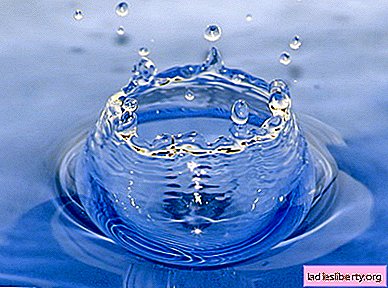
Collagen prolonging youth and preserving health is necessary for every person at any age. And in order not to lack it, often just a little to adjust the daily diet.
What is known about collagen and its benefits for the body
Collagen is a protein (fibrillar type of structure), which is one of the main components of the connective tissue of the human body, which includes, in particular, bones, ligaments, tendons, cartilage, joints, skin and even the iris of the eye.
Scientists know 28 types of collagen, differing in the sequence of amino acids that form the protein structure, of which 4 types are the main ones (for example, type III creates blood vessels).
The main purpose of collagen - giving connective tissues strength coupled with elasticity. In many ways, it is collagen that keeps the skin supple and smooth, youthful, and the joints - mobile, and it is also important to note its importance for:
• health of internal organs;
• formation of muscle mass;
• condition of hair (lush and silky) and nails (strong and shiny);
• prevention of atherosclerosis;
• cell renewal;
• regeneration of damaged tissues (including bone fusion);
• normal water metabolism in the epidermis;
• physical endurance;
• assimilation of calcium by the body;
• good vision.
Collagen accounts for about a third of the total protein in the body, so the importance and benefits of collagen for good health, as well as the consequences of its deficiency, are difficult to overestimate.
The production of collagen by the human body is an incredibly complex multi-level process, which can be influenced by many elements and factors.
About collagen, we can say that it is in a “cycle” state - it is produced, ensures the health of the whole body and inevitably collapses, and since its unsupported synthesis in the human body is usually insufficient, it is very advisable to constantly take care of collagen supply from the outside - with a varied balanced diet, sometimes with special nutritional supplements (and sometimes through cosmetic products and procedures).
But collagen coming from the outside is different from the one that produces the human body. Therefore, once in the gastrointestinal tract, “extraneous” collagen is broken down to amino acids, which, passing through the liver, partially enter the general bloodstream and are distributed through the connective tissues, finally turning into collagen, which is typical for humans.
Scientists came to the conclusion that collagen synthesis begins to slow down already at the age of 25, a significant inhibition of the process is noted after 40 years, and finally, around 60-65 years, the production of a number of the most important types of collagen is completely stopped, which, in fact, provokes in old age rapid deterioration of health and the development of specific diseases.
It is important to remember the adverse factors that slow down the synthesis and accelerate the destruction of collagen, which include:
• dehydration;
• prolonged or frequent stress;
• chronic hypoxia (oxygen starvation of cells);
• hormonal imbalance;
• excessive ultraviolet radiation;
• sleep disturbances (including lack of sleep);
• excessive drinking and smoking;
• unbalanced nutrition;
• insufficient or excessive physical activity;
• diseases (the most various).
How to adjust your diet to increase the benefits of collagen
It is important to note that collagen can be obtained with food only in meat, neither in plant foods, nor in mushrooms.
And if you evaluate the meat sources of collagen by the percentage of the substance in 100 g of the product, then the following picture will open:
• beef - 2.6;
• turkey - 2.4;
• pork - 2.1;
• lamb - 1.6;
• salmon fish (and this, in particular, salmon, trout, sockeye salmon, pink salmon, omul, chum salmon, whitefish) - 1.6;
• rabbit - 1.55;
• duck - 0.87;
• chicken - 0.7.
Various seafood, feathered and four-legged game meat, and home-made quail are also useful for collagen supplies.
Speaking of meat, it is also important to note that due to the use of turkey, the carnosine substance is synthesized in the human body, which can act as a stabilizer of collagen, which means its long-term greater resistance to the natural destruction process mentioned above.
As for the stability of collagen from other types of meat, the collagen from beef lingers the longest, the lamb in second place, and the one from pork is destroyed most quickly.
Gelatin made from connective tissues (hoofs, bones, tendons) of cattle and pigs is also valuable as a source of collagen.
Almost 90% gelatin consists of collagen fibers and is well absorbed.
But there will be little benefit from all this if on the table there are no substances contributing to the production of collagen contained in the following products:
• green tea, raspberries, cranberries, hot peppers, black rice (anthocyanin pigments);
• corn, pumpkin, bell peppers, carrots, persimmons, oranges, green beans, lentils, sorrel (but most of all contains lutein in orange vegetables and fruits);
• radish, beets, tomatoes (red vegetables are rich in silicon);
• cod and veal liver, pasta made from durum wheat (copper);
• wheat germ (zinc);
• blackcurrant, sea buckthorn, citrus fruits, blueberries (vitamin C);
• vegetable and butter (vitamin A);
• soy products - beans, milk, tofu (hyaluronic acid);
• sea kale (iodine);
• nuts (omega-3 fatty acids).
It is also useful to add to the diet:
• bitter chocolate;
• cereals - oatmeal, buckwheat, barley, rice;
• bran;
• dried fruits (prunes, dried figs, dates, raisins);
• pumpkin seeds;
• milk products;
• cheeses;
• cabbage (white, cauliflower, kohlrabi, broccoli);
• eggs;
• kiwi;
• green pea;
• potatoes;
• cherries and cherries;
• peaches;
• greens (especially leafy salads, as well as parsley, dill, cilantro);
• gooseberries;
• celery.
It is also useful to know that in many plant foods there is elastin, a protein with properties similar to collagen.
How to use collagen in dietary supplements
The properties of collagen in capsules, tablets and powder are almost equivalent, and the choice of form of release depends mainly on personal preference and what the manufacturer has laid down in it (whose instructions, by the way, it is important to follow strictly).
Despite the fact that you can’t find a more “pure” form of collagen, it has almost the same long way to go in the body - it must also be disassembled into amino acids and reassembled, but plus collagen additives in convenience - there is no need to strictly plan the diet, the result ( due to the high concentration of the substance) it is noticeable quickly and often collagen in the preparations is accompanied by substances that improve its absorption.
The course of taking collagen is 1-3 months, per year it can be repeated 2-3 times, but at mandatory intervals, usually equal to the duration of one course.
The daily intake of the drug depends on its form of release and individual indicators (gender, age, state of health, lifestyle).
Powdered collagen is dissolved in cool water or (if the taste is unpleasant) juice, capsule washed down with plenty of liquid.
It is optimal to take it in the morning on an empty stomach, but at least not earlier than 30 minutes before a meal or 1-2 hours after it, so that the body has the opportunity to correctly recognize and absorb collagen.
How to describe the harm of collagen
The dangers of collagen synthesized by humans can only be discussed in terms of its excessive content in the body.
If collagen is additionally supplied through food, this is almost impossible to achieve.
But when using a substance in the form of a dietary supplement, there is a risk of excessive intake, especially if you neglect the doctor's recommendations or their absence at all.
Collagen damage primarily affects the organs responsible for the processing and removal of substances entering the body - the kidneys, liver, and spleen. And after the deterioration of their functioning, the turn may come to a general metabolic disorder.
But even if you take collagen in the form of a powder (capsules, tablets) moderately, in the order of an individual reaction, you can encounter a number of symptoms:
• allergy (itching, rashes, swelling);
• increased blood calcium (increasing hypercalcemia);
• decrease in pressure (arterial hypotension);
• dryness and bad taste in the mouth and bad breath.
In these cases, so that there is no harm from collagen, firstly, you should stop taking the drug, and secondly, you should consult a doctor to select a more suitable dietary supplement with collagen or to find a way to stimulate its production without taking such drugs.
And as a rule, doctors prohibit the use of pure collagen during pregnancy and for the entire period of breastfeeding, but insist on the importance of adjusting the mother’s diet so that neither she nor the baby will lack essential substances.











